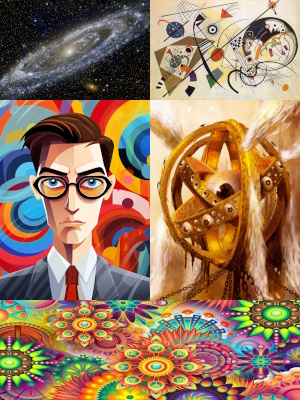On the right, we have first-thought psychism. I'm going to call it "psychism" because "idealism" has additional meanings. So there at the bottom, the most fundamental thing, is consciousness. Then, emerging from consciousness, we have space, and within space, we have humans and aliens, each with their own ways of thinking.
To pad my desktop view, I'm putting image credits here. The humans and green alien are from freepik.com; I can't find the original source for consciousness; the galaxy is M31 in Andromeda from Wikimedia commons; alien consciousness is the painting Transverse Line by Kandinsky; and the alien below is from Ophanim by Danilo Wolf.
 Now, here's how I see it. Again, the most fundamental thing is consciousness. Then, emerging from consciousness, we have humans and aliens. Above their heads we have their representations of reality. It might be more accurate to put them below, since they are developed through active engagement with the Universal, but I put them above to emphasize that they emerge from the qualities and choices of the two kinds of beings, and that other representations are available.
Now, here's how I see it. Again, the most fundamental thing is consciousness. Then, emerging from consciousness, we have humans and aliens. Above their heads we have their representations of reality. It might be more accurate to put them below, since they are developed through active engagement with the Universal, but I put them above to emphasize that they emerge from the qualities and choices of the two kinds of beings, and that other representations are available.You could even put other humans in the image, hunter-gatherers with their own representations, weirder to us than outer space, but not as weird as whatever aliens have. My point is that the stuff described by physics is not universal, but peculiar to us. Quoting Donald Hoffman, "We are the authors of space and time; their myriad contents are our impressive stagecraft." Aliens have their own stage, which is why I do not believe we will find any life in space that's intelligent enough to dream a universe.
I'm also wondering, if science is a representation, how much room do we have to represent it differently? I don't think flat earthers could actually make the Earth flat. Quoting Karen Blixen, "the Earth was made round so that we would not see too far down the road." But I wonder if future astronomers will figure out how to imagine space smaller and less hostile, so that it's easier to explore.]]>